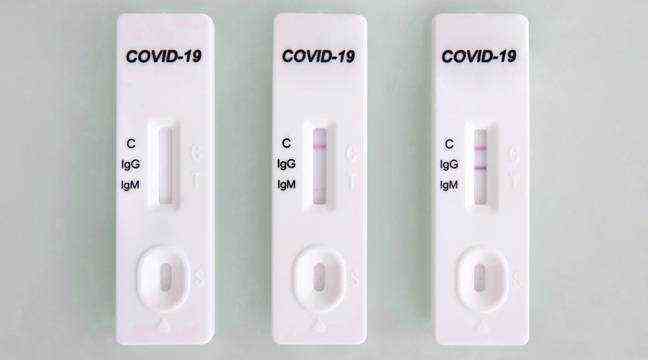The Haute Autorité de Santé recommends that a rapid serological test be carried out before the administration of the first dose of anti-Covid vaccine to identify people who have had the coronavirus without knowing it and to prevent them from an unnecessary second dose. – SYSPEO / SIPA
- In an opinion delivered this Thursday, the HAS recommends a serological test before the injection of the first dose of vaccine.
- The goal is to identify former asymptomatic coronavirus patients who ignore each other, and prevent them from having a second unnecessary dose.
- A measure that could make it possible to release millions of doses of vaccine.
A little bite before the vaccine? In an opinion issued this Thursday, the High Authority of Health (HAS) recommends the generalization of pre-vaccine serological tests. The goal: to identify, in people who come to be vaccinated, the presence of antibodies, a sign of a past infection with the coronavirus. In the event of a positive test, the second dose of vaccine would no longer be necessary. A measure that would release “several million” additional doses.
The Minister of Health, Olivier Véran, announced Wednesday that he would follow this advice. Thus, the vaccination centers will be equipped in June with “rapid serological tests to detect the presence of antibodies. And in that case, a single dose will suffice, ”he said.
A drop of blood and fifteen minutes of waiting
The health authority recommends carrying out this “pre-vaccine serology” with a rapid test, or TROD. A “non-compulsory test, which will be offered without age limit, including the youngest now eligible,” said Thursday, during a press point, the president of HAS, Dominique Le Guludec. It’s simple: just before the first dose is administered, just take a drop of blood from your fingertip. And 15 minutes later, that is to say the expected monitoring time after the vaccine, we obtain the result which indicates whether we already have antibodies against Sars-CoV-2 ”(the sign that we have already been in contact with the virus).
If the test is positive, the appointment for the second dose may be canceled. Because “the scientific data that we have today are clear: one dose is enough” for people already infected in the past, she explained. In an opinion of February 11, the HAS already recommended to vaccinate with a single dose in the event of a previous infection proven by the Sars-CoV-2 virus. Since then, “new scientific publications confirm that the vaccine protection of people who have been infected with the virus is better after a single dose of vaccine than that of people never infected with two doses,” assured the president of the HAS.
“Release doses”
“We rely a lot on the TROD to release doses,” says Elisabeth Bouvet, president of the technical committee on vaccinations at the HAS. But why deploy this measure only now, several months after the opening of vaccination in France? Since May 31, 28 million people over 18 are eligible without conditions. For the HAS, “an important reservoir” of “several million” doses would thus be made available, “in a phase of the campaign which targets younger people, and more likely to have developed asymptomatic forms of the virus without even the know, recalled Dominique Le Guludec. According to modeling studies carried out by the Institut Pasteur, more than 22% of people in metropolitan France have been infected with Sars-CoV-2, and more than 40% in Ile-de-France. However, the cases identified by a virological test represent only 8% of the population, ”she added.
The HAS recommends testing first in a few vaccination centers, to see if this provision does not disrupt the organization of the campaign, “before any large-scale deployment”.
The reliability of the serological tests in question
One question remains: are these tests effective enough? The advantage of TROD is that a drop of blood is enough to identify the presence of antibodies developed by the body after contamination. The problem is reliability. “To date, the available serological tests do not all have the same efficacy, and some TRODs, although having received a CE mark, are not as reliable as they promise”, worries Dr François Blanchecotte, president of
Union of biologists. He understands “the interest of identifying the millions of infected people who ignore each other in order to better vaccinate the entire population. But Covid-19 serology is not easy, and has also always had trouble finding its place in the strategy carried out by the health authorities. Moreover, except in specific cases, serological tests were not reimbursed until then ”. “We obviously recommend that this prevaccinal TROD be free,” Dominique Le Guludec reassured this Thursday.
Dr Lionel Barrand, president of the National Union of Young Medical Biologists (SJBM), has been asking HAS for many weeks to set up this pre-vaccine serology. “But the question that arises is: what performance, for what test, and for what indication? », He sums up. Because today, “if we know how to measure the level of antibodies, we still do not know what is the threshold allowing us to affirm that a person already contaminated has developed enough protective antibodies. Today it’s all or nothing: if you have antibodies you only get one dose, if you don’t have two. What interests us in this context are IgG, the antibodies which appear later after contamination ”.
This is why, for Drs. Blanchecotte and Barrand, recourse to pre-vaccine serology should be based on finer tests, “to avoid false positives.” We need more details on the quality of the tests that will be used ”. “We have very few false positives with serological TRODs,” replies Dominique Le Guludec, with a reliability of over 99%. The tests used have excellent specificities ”.

